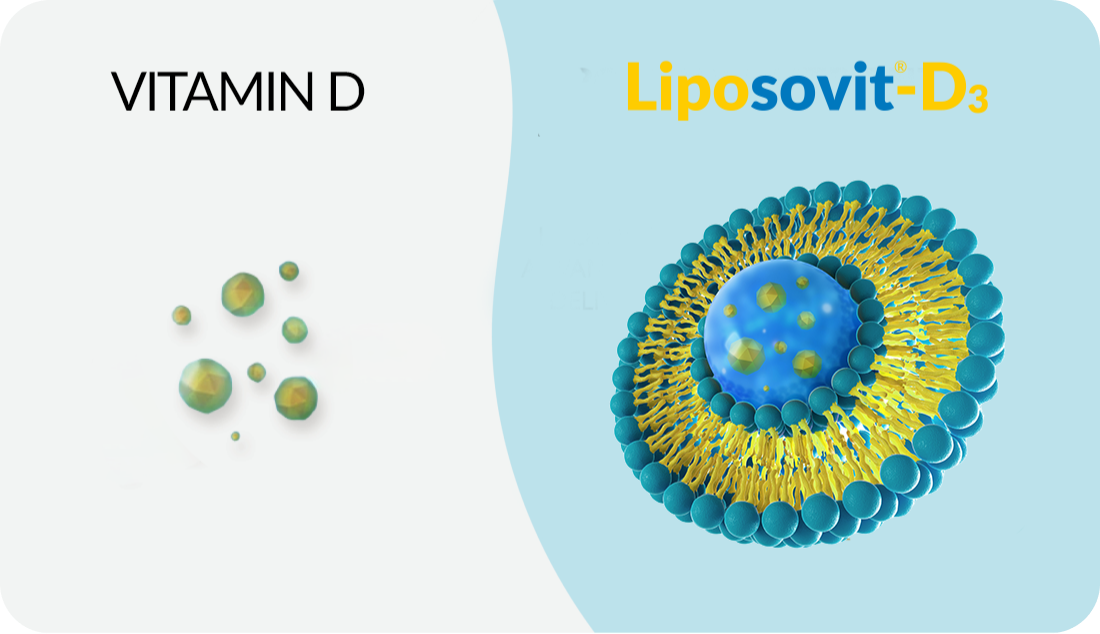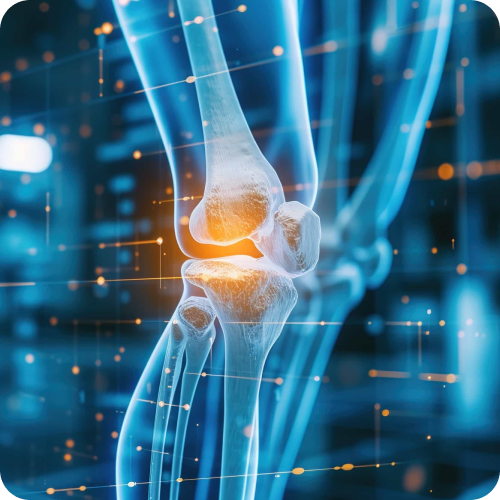





NuviaLab Vitamin D uses a liposomal form of vitamin D - Liposovit-D3®. Liposomal vitamin D has several advantages over regular vitamin D, mainly due to its unique formulation and the way it delivers the active ingredient to the body.
Key advantages of liposomal vitamin D:


Vitamin D plays a key role in bone health, and a lack of it can lead to serious health problems. Vitamin D is essential for the efficient absorption of calcium and phosphorus in the intestines. Calcium and phosphorus are key minerals that form hydroxyapatite, the main mineral component of bone. Without adequate levels of vitamin D, calcium and phosphorus are not properly absorbed, leading to bone demineralization.
In childhood, vitamin D deficiency can lead to rickets, a disease characterized by weakened and deformed bones because bone mineralization is impaired. In adults, a lack of vitamin D can cause osteomalacia, which results in soft bones, bone pain and increased susceptibility to fractures. Osteoporosis, another disease associated with vitamin D deficiency, leads to brittle bones and an increased risk of fractures, especially in older people.
Vitamin D is also important for dental health, as teeth are made of similar components as bones and also require calcium to maintain their structural integrity.

Vitamin D has a significant impact on immune system function, helping to regulate it and supporting its ability to fight infection. It is known for its effect on the function of T lymphocytes and macrophages, which are key cells in the body's defense against pathogens. Vitamin D supports the ability of T lymphocytes to recognize and attack foreign microorganisms and helps macrophages to engulf and destroy pathogens.
Studies1,2 have shown that people with adequate levels of vitamin D are less prone to infections such as the flu, the common cold and other viral and bacterial infections. Vitamin D also supports the production of antimicrobial peptides, such as cathelicidin, which have the ability to kill bacteria, viruses and fungi.
In addition, vitamin D plays a role in the prevention of autoimmune diseases, such as multiple sclerosis, rheumatoid arthritis and type 1 diabetes, by regulating the immune response and preventing excessive inflammatory reactions3,4,5,6.

Vitamin D has a significant impact on mental health and cognitive function. Vitamin D receptors are located in different areas of the brain, suggesting that it is important for brain function. Vitamin D is involved in the synthesis of neurotransmitters such as serotonin, dopamine and norepinephrine, which are key to mood regulation and mental health.
Vitamin D deficiency has been linked to a higher risk of depression, mood disorders and cognitive problems such as dementia and Alzheimer's disease. Studies show that people with low vitamin D levels are more likely to be depressed and have poorer performance on cognitive tests7,8.
Vitamin D supplementation can improve mood and reduce symptoms of depression, especially in people with vitamin D deficiency9,10. Vitamin D may also promote neuroplasticity11 - the brain's ability to form new neural connections - which is crucial for brain health and cognitive function.

Vitamin D plays an important role in cardiovascular health by regulating blood pressure, heart function and blood vessel health. Vitamin D affects the renin-angiotensin-aldosterone (RAA) system, which controls blood pressure and fluid balance in the body. By inhibiting renin activity, vitamin D can help prevent hypertension.
In addition, vitamin D has anti-inflammatory properties that help protect blood vessels from inflammation, which can lead to atherosclerosis - the buildup of fatty plaques on the walls of blood vessels, which in turn can lead to heart attacks and strokes.
Vitamin D deficiency is associated with an increased risk of heart disease, including heart failure, coronary heart disease and cardiac incidents. Studies suggest that people with low vitamin D levels are more likely to develop hypertension and have poorer cardiovascular-related health outcomes12,13.

Vitamin D is essential for proper muscle function, and a lack of it can lead to muscle weakness and an increased risk of falls and injuries. Vitamin D receptors are located in skeletal muscles, and vitamin D is crucial for muscle health and function.
Vitamin D deficiency can lead to myopathy - muscle weakness that can cause pain and difficulty moving. The elderly, in whom vitamin D deficiency is common, are particularly vulnerable, and muscle weakness increases the risk of falls and fractures.
Vitamin D supplementation can improve muscle strength and motor coordination, which is key to maintaining independence and quality of life in the elderly. Studies show that adequate levels of vitamin D can reduce the risk of falls and improve overall physical fitness14.






Vitamin D supplementation can be beneficial for many groups of people, especially those who are at higher risk of vitamin D deficiency due to limited sun exposure, age, skin color, health status, diet or special periods of life, such as pregnancy and breastfeeding. NuviaLab Vitamin D replenishes deficiencies faster and more effectively with Liposovit-D3®, a unique lipid form of vitamin D. Don't delay, take care of your health. Order now!
| How should NuviaLab Vitamin D be used? | + |
| Who can use NuviaLab Vitamin D? | + |
| When can I expect the effects of using NuviaLab Vitamin D? | + |
| How long is the packaging of NuviaLab Vitamin D sufficient for? | + |
NuviaLab Vitamin DServing Size: 1 CapsuleServings Per Container: 60 |
||
| Active Ingredients | Amount Per Serving | |
|---|---|---|
| Liposovit®-D3 (liposomal vitamin D), of which: Vitamin D |
25,00 µg (1000 IU) (500%*) |
|
NRV – Nutrient Reference Value
INGREDIENTS: Acacia Fiber; Glazing Agent (Capsule Shell) – Hydroxypropyl Methylcellulose; Liposovit®-D3 (Maltodextrin, Gum Arabic, Glycerol, Lecithins, Alpha-Tocopherol, Cholecalciferol (Vitamin D)).
NuviaLab® is a registered trademark of NuviaLab Limited.
Liposovit® is a registered trademark of BART.
DIRECTIONS FOR USE: Recommended daily dose – 1 capsule – washed down with 200 ml of water.
CAUTION: Do not exceed the recommended daily dose. Before use, it is advisable to perform a 25-(OH)D blood test and consult the test result with a doctor or pharmacist. Not suitable for children, pregnant or lactating mothers. Do not take it as a substitute for a varied balanced diet or a healthy lifestyle. Balanced diet and healthy lifestyle are essential.
STORAGE: Keep out of direct sunlight in a cool and dry place. Keep out of sight and reach of children.
BEST BEFORE END / BATCH NUMBER: See the bottom of the bottle.
COUNTRY OF ORIGIN: European Union.
NET WEIGHT: 41.40 g
1 https://www.ncbi.nlm.nih.gov/pmc/articles/PMC3756814/
2 https://www.ncbi.nlm.nih.gov/pmc/articles/PMC4346469/
3 https://www.ncbi.nlm.nih.gov/pmc/articles/PMC6960236/
4 https://pubmed.ncbi.nlm.nih.gov/35082139/
5 https://pubmed.ncbi.nlm.nih.gov/36745886/
6 https://www.ncbi.nlm.nih.gov/pmc/articles/PMC9149265/
7 https://pubmed.ncbi.nlm.nih.gov/28914205/
8 https://pubmed.ncbi.nlm.nih.gov/22536767/
9 https://pubmed.ncbi.nlm.nih.gov/32217340/
10 https://pubmed.ncbi.nlm.nih.gov/32108263/
11 https://pubmed.ncbi.nlm.nih.gov/25138265/
12 https://www.ncbi.nlm.nih.gov/pmc/articles/PMC2851242/
13 https://www.ncbi.nlm.nih.gov/pmc/articles/PMC9538425/
14 https://www.ncbi.nlm.nih.gov/pmc/articles/PMC9399608/